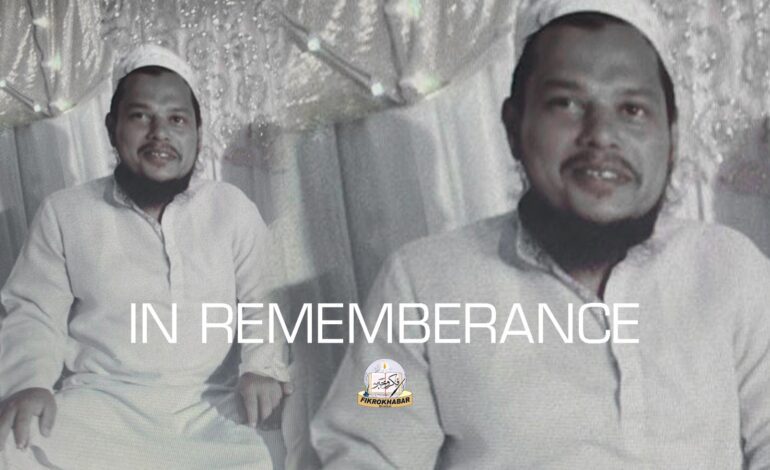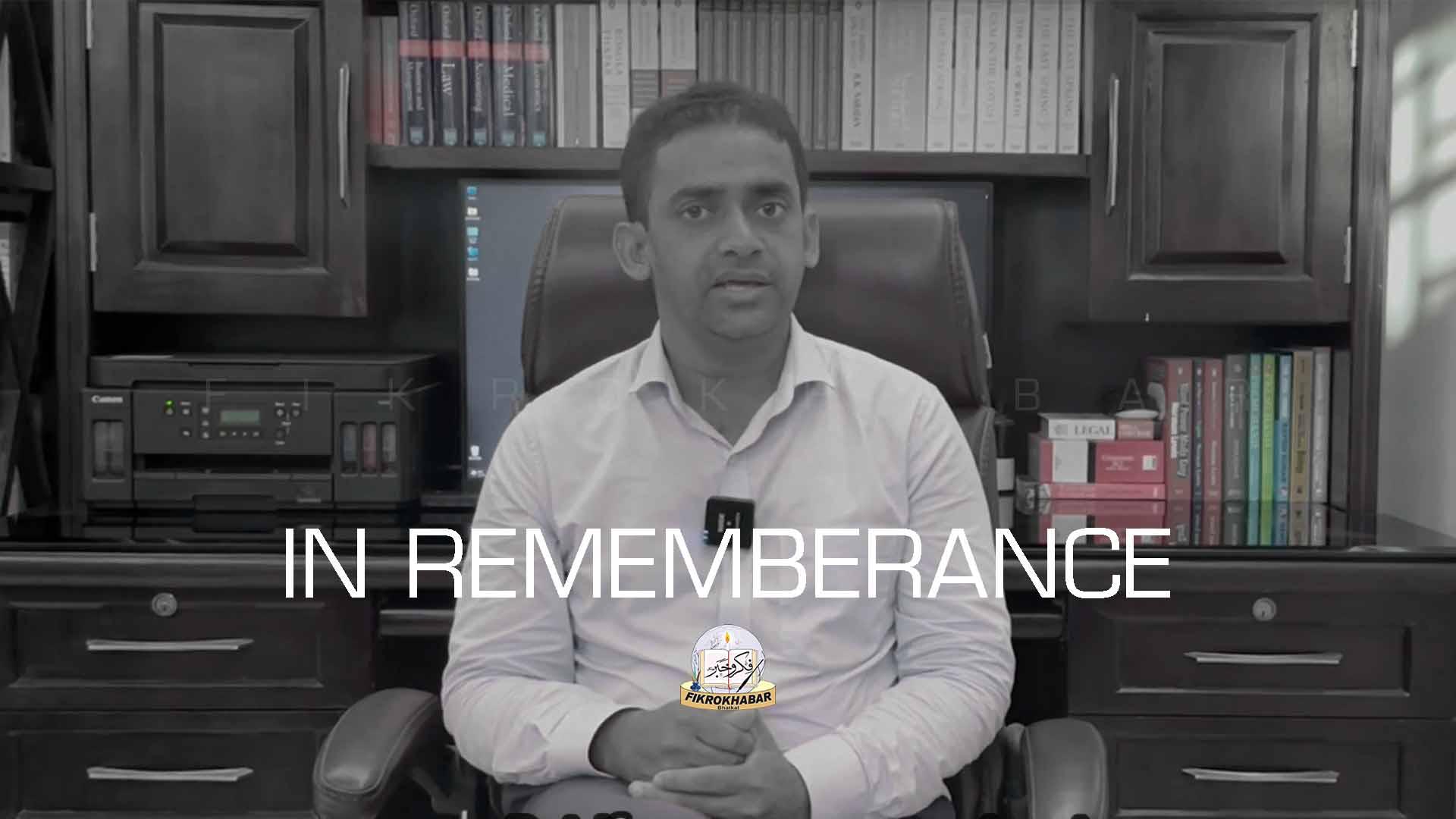
“He Bloomed, Yet Could Not Bloom With a Smile”
(An Article by a Grieving Friend on the Demise of Moulana Hidayatullah Nadwi) Written by: Abdul Hafeez Khan Nadwi (Editor, Mash’al-e-Raah, Bhatkal) Responsive Ad Block Advertisement × In this universe,
(An Article by a Grieving Friend on the Demise of Moulana Hidayatullah Nadwi)
Written by: Abdul Hafeez Khan Nadwi (Editor, Mash’al-e-Raah, Bhatkal)
In this universe, there is no human being who can escape death. Death is an inevitable and certain reality. Every person, sooner or later, has to leave this transient world and journey toward the eternal abode. This is the law of nature, and there is no escape from it. Yet, there are certain personalities whose sudden departure creates a strange, indescribable void in the hearts. Grief and sorrow fill the soul, and a gap emerges that is not easily filled. Their loss is not only personal for family and friends, but also a significant setback for society and the community. Their absence weighs heavily, and the unending chain of memories repeatedly brings tears to the eyes.
Among such personalities was the honorable Moulana Hidayatullah Nadwi (رحمہ اللہ) . He was an institution in himself—always striving for reform and spiritual nurturing. The mission of his entire life was to establish society and the community on the principles of Islam and to awaken religious consciousness in the younger generation. To bring this mission into practice, he, along with like-minded companions, formed a strong team and dedicated himself day and night to this noble cause. Serving the religion was both his passion and the very purpose of his life.
When Allah chooses someone for His service, He nurtures him in the best environment and upbringing. The late Maulana Nadwi was one of those fortunate souls. His father was a man of religious disposition and devoted to Dawah (Islamic preaching). Perhaps that is why he chose to dedicate his son to religious education and admitted him into the great seminary, Jamia Islamia Bhatkal. After completing his Alim course there, he pursued higher studies at Darul Uloom Nadwatul Ulama, Lucknow, where he graduated with distinction.
From his student days, he was closely connected with the Dawah and Tabligh movement. He frequently dedicated time in Jamaats, which developed his religious insight and oratory skills. Maulana Nadwi was cheerful by nature and lighthearted. His peers would often engage him in humor, forming a circle and encouraging him to deliver speeches imitating great scholars. This habit later proved highly beneficial for his religious mission.
After completing his education, he began his religious services in a small town named Chandavar, about 60–70 kilometers from Bhatkal, where he served as Imam and Khatib. Observing the lack of religious guidance in the surrounding areas, he prepared a plan of action with his companions. One of his friends suggested that he and Maulvi Meeran (then Imam of Haldi Pur, now Imam of the Central Mosque in Kumta) join hands to spread Dawah in nearby villages. After consulting a teacher from Jamia Islamia, it was decided that this service should not remain temporary, but be organized systematically. Thus, under the platform of Abna-e-Jamia (Alumni of Jamia), the movement of Friday delegations was launched.
Alhamdulillah, the impact of this effort is visible even today. Under the leadership of Maulana Nadwi, Friday delegations continued in Kumta and its surrounding areas (Kagal, Haini, Guzkagal, Honli, Chandavar, Shirur, Byndoor, and Goli Hole). In recent years, this work also expanded to Ifarghon. As long as he remained healthy, he would personally lead these delegations. In Kumta, he also performed Nikah ceremonies and was deeply passionate about this work. His dedication was evident even during his illness, when, at a meeting held at the residence of Maulana Muhammad Ameen Ruknuddin, he expressed his sorrow:
“It pains me that despite the presence of so many scholars in Bhatkal, many spend their Fridays here. I wish that those who do not have responsibilities of leading Friday prayers in Bhatkal would go to nearby villages to deliver Khutbah and spread religious awareness.”
Everyone was astonished to see how, despite being sick, he remained consumed by concern for the religion. Even during his illness, he continued fulfilling his duties for several weeks.
Looking at his determination, mission, and passion for service, one realizes that he yearned to accomplish much more. Even the remarkable work he achieved in his short life, he considered too little. His heart burned with an unquenchable zeal to do more and more for the religion. One often felt that he was a person who, if given more time, would have accomplished far greater service for the community. It seemed as though he had only just begun to bloom, and wanted to bloom further—but whose will can prevail against Divine decree? He completed his destined lifespan, leaving behind a message that life is short, and true success lies in dedicating this fleeting time to the service of faith. Indeed, his personality and struggle are best captured in this couplet:
“This flower could not receive full praise for its beauty,
It bloomed, yet could not bloom with a smile.”
Maulana Hidayatullah Nadwi’s role was not limited to religious service; he was also prominent in the social field. He was the driving spirit behind the Uqab Cloth Bank, always at the forefront in helping the poor and needy. He, along with his companions, would personally visit underprivileged villages, assess their conditions, and provide not only spiritual guidance but also material assistance. His humanitarian spirit extended even to non-Muslim communities, where he engaged in welfare work motivated by compassion and concern for humanity.
In his final two years, though bedridden with illness, his face never lost its radiance. Visitors could hardly sense he was suffering. Never did a word of complaint escape his lips. He always met people with cheerfulness, humor, and warmth. His sweetness of temperament was not confined to his friends and colleagues alone; he treated everyone—whether familiar or unfamiliar—with affection and kindness.
Today, as he has completed his life’s journey and left us, hearts are grieved and eyes filled with tears. A dynamic, active young scholar of Islam—caring for his companions, and entertaining them with humor—has departed. His absence will be felt for years to come. Those private gatherings that once echoed with his laughter will now fall silent in sorrow.
But how can one express the depth of grief endured by his family—his parents, wife, little daughter, siblings, and other relatives? Words cannot capture the pain they feel. His friends and colleagues, too, will feel the sting of his absence for a long time. Undoubtedly, his death is not only a personal tragedy for his family, but also an irreparable loss for the entire community and the religious circles. His prayers, advice, and contributions—both religious and social—will always be remembered, leaving a fragrance in hearts forever.
During his illness, not only his family but also his classmates and companions took great care of him. May Allah reward them abundantly. We pray to Allah Almighty to forgive Maulana Hidayatullah Nadwi, make his religious services a source of everlasting reward for him, and grant him the highest station in Jannat al-Firdaws. May Allah also bless his family members, friends, and companions with patience and perseverance. Ameen, Ya Rabb al-Alameen.
Source: Original Urdu article written by Abdul Hafeez Khan Nadwi (Editor, Mash’al-e-Raah, Bhatkal) Translated into English





